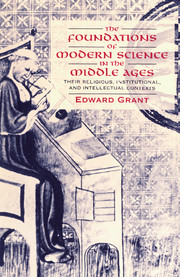 The Foundations of Modern Science in the Middle Ages
The Foundations of Modern Science in the Middle Ages Book contents
- Frontmatter
- Contents
- Preface
- 1 THE ROMAN EMPIRE AND THE FIRST SIX CENTURIES OF CHRISTIANITY
- 2 THE NEW BEGINNING: THE AGE OF TRANSLATION IN THE TWELFTH AND THIRTEENTH CENTURIES
- 3 THE MEDIEVAL UNIVERSITY
- 4 WHAT THE MIDDLE AGES INHERITED FROM ARISTOTLE
- 5 THE RECEPTION AND IMPACT OF ARISTOTELIAN LEARNING AND THE REACTION OF THE CHURCH AND ITS THEOLOGIANS
- 6 WHAT THE MIDDLE AGES DID WITH ITS ARISTOTELIAN LEGACY
- 7 MEDIEVAL NATURAL PHILOSOPHY, ARISTOTELIANS, AND ARISTOTELIANISM
- 8 HOW THE FOUNDATIONS OF EARLY MODERN SCIENCE WERE LAID IN THE MIDDLE AGES
- Notes
- Bibliography
- Index
7 - MEDIEVAL NATURAL PHILOSOPHY, ARISTOTELIANS, AND ARISTOTELIANISM
Published online by Cambridge University Press: 05 June 2012
- Frontmatter
- Contents
- Preface
- 1 THE ROMAN EMPIRE AND THE FIRST SIX CENTURIES OF CHRISTIANITY
- 2 THE NEW BEGINNING: THE AGE OF TRANSLATION IN THE TWELFTH AND THIRTEENTH CENTURIES
- 3 THE MEDIEVAL UNIVERSITY
- 4 WHAT THE MIDDLE AGES INHERITED FROM ARISTOTLE
- 5 THE RECEPTION AND IMPACT OF ARISTOTELIAN LEARNING AND THE REACTION OF THE CHURCH AND ITS THEOLOGIANS
- 6 WHAT THE MIDDLE AGES DID WITH ITS ARISTOTELIAN LEGACY
- 7 MEDIEVAL NATURAL PHILOSOPHY, ARISTOTELIANS, AND ARISTOTELIANISM
- 8 HOW THE FOUNDATIONS OF EARLY MODERN SCIENCE WERE LAID IN THE MIDDLE AGES
- Notes
- Bibliography
- Index
Summary
Because Aristotelian natural philosophy is the major emphasis in this volume, our discussion of it must necessarily encompass Aristotle's natural books (libri naturales), as described in chapter 3, and the medieval commentaries and questions on those works. The natural books of Aristotle were far from a thorough, well-rounded, coherent, and systematic description and analysis of the physical world. But in those treatises, a wealth of topics and ideas were included, and a remarkable breadth of coverage. The natural books were the best available guides for the study of the universe, which is why they served as the fundamental texts for natural philosophy in the universities of the Middle Ages. It was that natural philosophy that functioned as the world view of the Middle Ages, a world view that was embodied in a special kind of literature – the questions literature – that was peculiar to the Latin Middle Ages and to the medieval university.
THE QUESTIONS LITERATURE OF THE LATE MIDDLE AGES
The questio, or question, was the most widely and regularly used format for natural philosophy. As we saw in chapter 3, it grew out of the commentary, but it was structurally akin to the oral disputation that was such a prominent feature of medieval university education. It was actually a teaching master's written version of the questions that he presented orally in his classroom lectures.
- Type
- Chapter
- Information
- The Foundations of Modern Science in the Middle AgesTheir Religious, Institutional and Intellectual Contexts, pp. 127 - 167Publisher: Cambridge University PressPrint publication year: 1996
- 1
- Cited by


